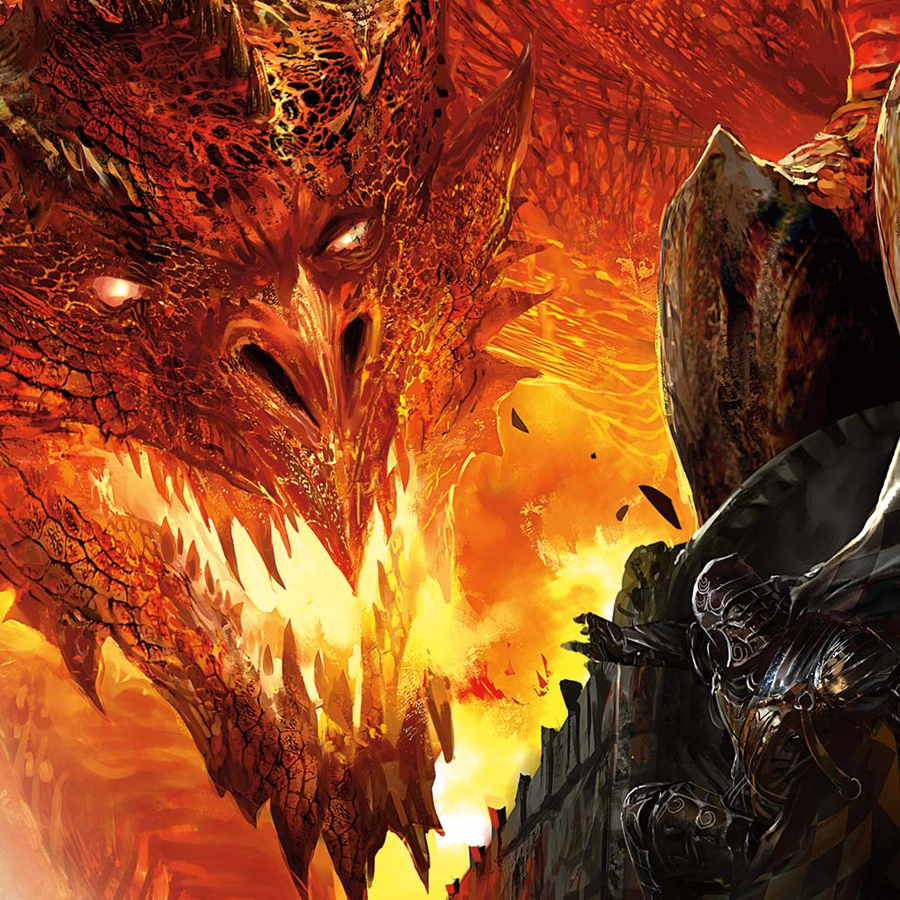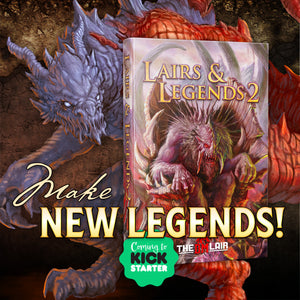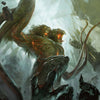How to Overcome Dungeon Master Burnout

Written by Luke Hart
It’s no secret that dungeon masters have a lot of pressure and responsibility. When the pressure and responsibility turn into fatigue from running and preparing for your games, you might lose touch with the fun of being a DM. When you, as the game master, stop enjoying this process of preparing and running games week after week and month after month, when you kind of feel like you don’t want to do it anymore, that’s dungeon master burnout, and it can destroy a game.
DM burnout has several stages, though they don’t always happen in this order, and not every game master presents with every stage.
Stage 1
You start joking or mentioning that you’re kind of sick of running the game and wish you could just be a player instead. You sometimes slip in little comments about how you wish someone else would run the game. Or you might flat-out ask your players if anyone else would rather be the game master.
Stage 2
You are tired, fatigued, and feeling like you’ve just had enough. You stop preparing as much for your game, or you don’t prepare at all. When you do muster up the go juice to prepare, it feels more like a job than a hobby or something you do for fun. And when you run the game, you feel tired, probably look tired to your players, and you may end the game early.
Stage 3
You begin to get defensive during the game and might even take your frustrations out on the group. You might start railroading your players to get to the end of the adventure or game session so you can just be done.
Stage 4
Game master burnout has fully set in. Every annoyance in your game is a reason to quit or end the game session. Games start getting canceled or rescheduled, which is kind of the same thing. When this happens, it is a slow spiral to the possibly inevitable conclusion of ending the game altogether.
Watch or listen to this article by clicking the video below.
Today, we’re going to go over dungeon master burnout. It is possible to prevent it when you start to see the signs I mentioned above, but it just happens sometimes, and you’ve simply got to find a way to deal with it.
Now, I will submit that DM burnout is actually a good thing. It’s not good that you’re feeling that way, and it doesn’t have good effects on the game, but that’s not what I mean is good. What I mean when I say that dungeon master burnout is good is that it is a useful lead indicator that something is wrong and needs to change. And something might not just be wrong with the game for you, as the game master, but your players might also be experiencing this. Once you see the signs of GM burnout, you want to take action to correct the situation.
The rest of this article will have three parts. First, we’ll go over how to manage dungeon master burnout while experiencing it. I’ll wager a guess that if you’re reading this article, this is the stage you’re in. Second, we’ll move on to how to prevent DM burnout. Finally, we’ll cover what your players can do to help alleviate gain master burnout.
So, this is not a game master-only article. If you are experiencing game master burnout, feel free to share this article with your players and maybe just tell them to read the last bit of it.
How to Deal with GM Burnout
The very first thing you should do is talk to your group. Your players need to know how you’re feeling. I imagine they’re probably going to want to help if they can. I know most of my players would offer to help in some way or another if I expressed that I was experiencing game master burnout. When you’re in this quagmire of burnout, sometimes your brain just doesn’t work very well, and you don’t even know what to do. But your players might have some very useful suggestions that will help. Many players have been game masters themselves before and could have experience with the very same thing.
Next, you need to determine why you’re burned out. This is an insanely critical step. If you don’t know why you’re burned out or what’s going on, then your chances of fixing the issue are slim. So, ask yourself, are you burned out because of yourself in one way or another, or is it your players? Is a particular player giving you a real headache at every game session and stealing your desire to play? Perhaps your entire group doesn’t fit your style of game mastering. Is the game just stagnating? Are the players having less fun, and thus affecting your own fun?
Or is your life getting in the way? Are you extremely busy because of work or family, perhaps in the middle of summer? Or are you going through some family issues that are affecting your ability and desire to play? I know that personally, almost every single time I’ve experienced game master burnout, it’s been because I was so very busy with work or going through a personal issue, sometimes family-related.
Is something else going on in your life affecting your hobby life? If something in your life is affecting your mood and enjoyment as a whole, do something about it. That lack of enjoyment will bleed over into the game. There’s nothing you can do to prevent that. If you can’t fix whatever this life problem is, I suggest at least talking to somebody about those problems. This might even mean professional help if the situation is severe enough. The bottom line is that there is no substitute for a healthy mind and a happy life. DM burnout could be a sign of a deeper problem, and your first responsibility is to your own well-being.
Now, I also recognize that many of us escape the pressures and problems of life through roleplay, so it’s quite possible that running the game is the fix if it helps you through the difficulties of real life. But that may not be the case for you, or it might not always work.
I also suggest not settling on the first cause of GM burnout that you brainstorm. Keep thinking about it. A common practice in professional circles is to do something called the 5 whys. This exercise helps you drill down to the root cause of a problem.
It literally consists of asking yourself why five times and answering the questions. Why do I feel burned out? I’m tired of preparing for my game. Why? Because I don’t have time, and it’s frustrating to have to prepare in a rushed manner. Why? Because it’s summertime and we’re going on lots of family trips, and things are heating up at work as well. Why? Um . . . because.
Once you finish drilling down with your why questions, you’ve probably arrived at the root cause. Now that you have the root cause, which in this case is simply being very busy with family and work activities, you can start to theorize solutions. The problem isn’t the game, and it isn’t being a game master; you’re just busy.
I think being busy with life is often the root cause of game master burnout. The fact is that preparing for your games takes a lot of time, particularly when designing adventures for PCs or sometimes custom monsters. You know you want to keep your players on their toes, and things out of the monster manual just get boring after a while. So, I think that for many game masters, reducing the time you spend prepping for your games can help with burnout.
This might mean simply doing less prep than usual and focusing on only prepping the bare essentials. However, that could sometimes negatively impact the quality of the game, too. Other game masters may prefer to use pre-made resources to reduce their prep time. The advantage of pre-made resources is that you still have a professionally designed game to run without having to spend time creating it. All you have to do is prepare the pre-made adventure.
For example, I had to prepare for a game session that I run for my ancient dragon patrons. For that game, we ran through my Escape from the Fey module, for which I had already written almost everything. That means that prior to our game session, all I had to do was read the adventure and prepare to run it for them. I crap you not, that took me about one hour. Read an entire adventure, including about ten custom monsters for it, take a few notes, and highlight key parts on the printout so I wouldn’t miss them.
Now, compare that to how long it takes to create an adventure from scratch. Generally speaking, it takes me about four hours to create an adventure, though sometimes it takes a little longer or a little less. Even though I wrote it months ago, I’m saving myself three hours by using a pre-made adventure. I have a horrible memory, so even though I wrote the adventure myself, I had forgotten almost everything about it.
If reducing your prep time doesn’t do the trick, maybe it’s time to take a break. Perhaps you just need rest. I know that in the past, when I took a break, it helped me reconnect with the fun of the game and why I enjoyed running the games, and it helped revitalize me. Taking a break made me miss running the game and want to do it again.
You can take a longer break, say a month or two, but you could also take short breaks. If you run a weekly game, go biweekly for a while. If it’s a biweekly game, go to every three weeks or once a month for a little bit. You might also keep running your current schedule but run shorter games for a while—instead of four hours, just do two.
If you do take a long break, I would put a time limit on it up front. Make a commitment to yourself and your players that you will all start playing again on X date. Schedule it and put it on your calendar. There is a chance that if your break doesn’t have a planned end date, it may never end, and the game will die. Part of this has to do with leaving your players in limbo.
If they have no idea when or if the game will start up again, they might start making other plans with their time or finding different games to play in. And then, when you eventually decide to start running the game again, you may find that you have no players. So, let your players know how long the break is and when the game will start up again.
When I want to take an extended break, I prefer to ask one of my players to run the game in the meantime. I’ll still go as a player, but not as the game master. This is exactly what I did when my Sword Coast Guard campaign ended. About three or four of my players volunteered to run one-shots for us in different game systems. Kevin ran a one-shot in Savage Worlds, the superhero version. Alex ran a one-shot in Hack Master. Trevor ran a one-shot in Pathfinder 2. And Joe ran a one-shot in Shadow Run.
Each of these one-shots lasted two or three game sessions, which gave me about a three-month break. When I came back to start up my own Pathfinder 2 campaign, Thieves Abound, which you can actually watch on YouTube if you want to, I was revitalized, excited to run the game, and raring to go.
When dealing with dungeon master burnout, I also suggest trying to rediscover why you loved playing D&D in the first place. What is it about the game that excites you? Once you figure that out, deep dive into that aspect. For instance, the part about the game that I love is designing adventures and running them for my players. I don’t really care about creating custom monsters, magic items, NPCs, or worldbuilding. It’s the meat of adventure writing that really gets me going. Now, I also love reading monsters that others have made because it’s exciting. It makes me want to run games with those monsters in them. So, find the things that excite you and focus on those.
Next, consider changing things up. Doing something different can cure burnout. Switch up how you’re running the game. If your game is combat-heavy, run a heist. If your campaign mostly focuses on horror, run an adventure that is lighter or comical. Take the characters on a side quest that feels different from the same old game. Put the current campaign on hold and play a different campaign for a while, or maybe just a one-shot. Or, if, after discussing it with your players, you feel that the current campaign just isn’t working, maybe you scrap it and start again with a different idea. If you run a home root game, run a published adventure or two for a while.
How to Prevent GM Burnout
Now, many of the same things that can help with game master burnout can also prevent it. However, here are a few unique things you can do to prevent burnout to begin with.
The first way you can prevent gamester burnout is by taking care of yourself. This may seem like a no-brainer, but take a break during your prep time. Get some fresh air and sunlight. Do something else that relaxes you or makes you happy. Remember that it doesn’t always just have to be nose-to-the-grindstone work when preparing for your game. Enjoy the process.
Second, do something besides just being a dungeon master. Find a game you want to play in so you can be a player rather than always the game master. Maybe one of your players is running a game that you could join. You could also look for an open public game such as Adventures League or Pathfinder Society. Obviously, online games are an option, even if they are admittedly not nearly as fun as playing in person.
Next, immerse yourself in creative input. Game-mastering is primarily output. You are creating things; you are running the adventure. You are giving, giving, giving. Try taking, instead. Watch a movie you love or have wanted to see or do something new that might inspire you. Read a new book where you might look for inspiration, or read some old favorites. For instance, my bookcase has many of my favorite fantasy books that inspire me. Maybe you play a video game and think about ways you could do something similar in your D&D game. Perhaps you do any of these things and simply don’t think about your D&D game, and you just focus on absorbing someone else’s creativity.
Also, do not neglect conditioning your creativity. This one takes some work, but it can have a huge benefit. When you’re not burned out, have something going on in the background whenever you plan or prep for your game. This might be the same music playlist—I love the Conan the Barbarian soundtrack, for instance—or a TV series or movie you’ve seen so many times that it won’t distract you—Lord of the Rings, for instance, is one that would work for me. Anything that won’t distract you but that you enjoy will do the trick.
Then, when you need to be creative, do the same thing. Play Conan the Barbarian or Lord of the Rings. This conditions your mind to be creative when that thing is happening. Eventually, you won’t have to do it every time, only when you feel you really need it. As long as you’re reinforcing it once in a while, it will be like uncorking a bottle of creativity whenever you do it.
How Players Can Help
First, show your game master encouragement and gratitude. A lot of GMs have fun because their players are having fun. When players express their gratitude, it can really increase the game master’s morale and spirit. I would consider not just saying good game or thanking them before you leave. Instead, I would specifically point out a part of the game you enjoyed.
For instance, if there was a combat that was really well-designed and lots of fun, specify that. You see, when you get specific, it has more meaning and will be interpreted as genuine feedback. If someone just says thanks for running the game, that could just be the polite social thing to say. However, when a player gets specific, the game master knows they really enjoyed the game, which means that much more to them.
Next, actively participate in the game. Obviously, be at the game and arrive on time. You’d be surprised how much just showing up, showing interest, and taking responsibility for your attendance will encourage the GM.
Then, take charge of your character and help drive the action in the game. Don’t always just be reactive and respond when something in the game happens to you; instead, take the initiative. Be the one who pushes forward, opens doors, or initiates conversation with NPCs. Be the one who offers solutions to problems or takes the lead on an issue.
You can encourage the table to keep things moving forward rather than stalling for long periods or spending too much time on something mundane, such as a shopping trip or unnecessary discussion of some aspect of the game world or game mechanics irrelevant to the campaign. When you help in this manner, you’re taking some of the burden off the game master, who usually has to do this sort of thing.
Finally, be in the moment. Pay attention. Don’t be on your phone. Show active interest during the game.
You can also give your game master a break. Take some responsibility for an aspect of the game that removes something from the GM’s shoulders. If the game is always at the game master’s house, offer to host. It may not work if your game master has a lot to transport, but making the offer is still a nice thing to do. I know that when I host games at my house, it takes extra time to set things up as the host. Keep detailed notes on what happens in the game and provide them to the entire group, including the game master, at the end of every session. This might be in an online document that everyone can access.
Take responsibility for scheduling or making sure the other players are present and on time. Perhaps you learn the rules of the game inside and out and offer to be the rules guy who helps the GM adjudicate rules as written or look things up quickly at the table so they don’t have to work as hard.
Offer to buy your game master the next sourcebook coming out for the game or pay for their lunch during the game. Money can be a big stressor in life in general, and game masters often spend a lot of money on the game. Help them with that burden. Offer to run a one-shot or a short campaign to give your game master a break. Not every game master wants this, but the offer is very nice to receive.
You might also be the one who proactively suggests that the group take some time off so the game master can recharge their batteries. Reassure the game master that you will be there and ready to play when they’ve had the time they need.
And the business possibility, be there for your game master outside of the game. Be a friend. There may be something else going on in their lives, and they may just need someone to understand and talk to. However, be careful not to force it if they seem like they don’t want to talk about things.
The Ultimate 5e Anthology for DMs
Lairs & Legends 2 and Loot & Lore 2 are the ultimate game master resource! These two massive books put an anthology of everything you need to run amazing games for YEARS at your fingertips.
- Over 30 Adventures
- 30 Stand-Alone Encounters
- More than 100 Monsters
- Traps and Puzzles
- 6 New Rule Sets
- And much more!
These books are written to make running the game easy for new and veteran GMs. Each resource is built with intuitive formatting, clear wording, and evocative art. You’ll never again have to dig through dense paragraphs to find critical details you need during a live session.
These 5e resources are designed to scale to your needs, whether it’s a quick drag-and-drop trap to add some spice to your session or complete adventures that span levels 1 to 20. The sky’s the limit with what your games can become with Lairs & Legends 2 and Loot & Lore 2.
-
Posted in
Game Master How-To Articles






